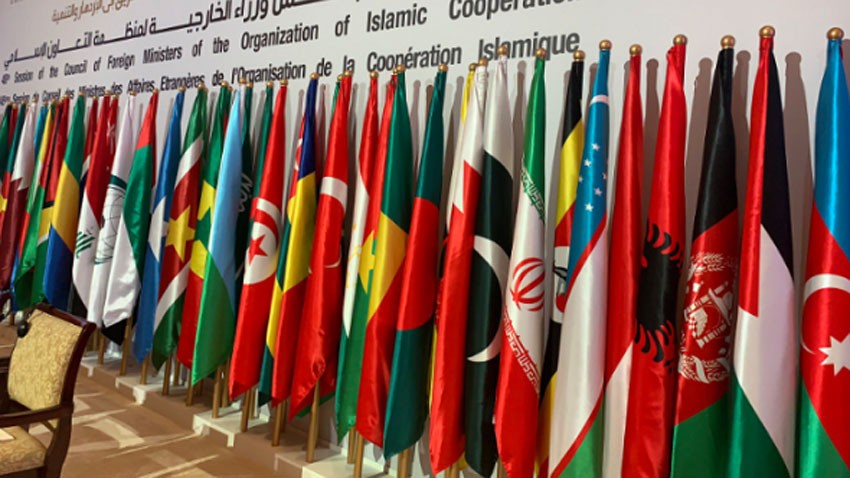On Pakistan’s call, an Emergency Virtual Meeting of the OIC Contact Group on Jammu & Kashmir was held at the Ministerial level on Monday, focused on the worsening situation in Indian Occupied Jammu and Kashmir (IOJ&K).
The OIC Secretary-General Dr. Yousaf Al-Othaimeen chaired the meeting.
The Foreign Ministers of Azerbaijan, Saudi Arabia, Turkey, and senior representatives of Niger attended the meeting and made statements.
The Foreign Makhdoom Shah Mahmood Qureshi led the Pakistani delegation.
The President of Azad Jammu & Kashmir Masood Khan and True Representatives of the Kashmiri People also participated in the deliberations and shared their perspective.
The OIC-Independent Permanent Human Rights Commission (IPHRC) presented a report on the deteriorating human rights situation in IOJ&K.
In his opening remarks, the OIC Secretary-General stressed the OIC’s commitment to finding a peaceful settlement of the Jammu and Kashmir dispute in accordance with the relevant resolutions of the UN, Islamic Summits and CFMs.
The OIC Secretary-General called on “the international community to strengthen its efforts to assist the people of Kashmir to decisively practice their legitimate rights denied for decades.”
In his statement, the Foreign Minister Shah Mahmood Qureshi apprised the participants of the worsening situation in IOJ&K and India’s illegal and unilateral steps of 5 August 2019.
The foreign minister stated that the RSS-BJP dispensation in India was bent upon perpetuating India’s illegal occupation of IOJ&K to pursue its Hindutva agenda.
Highlighting the plight and agony of the people of Kashmir, he stated that 8 million Kashmiris continued to face lockdown, military siege, communications blockade, and unprecedented restrictions for over 10 months.
Shah Mahmood Qureshi said that Indian occupation forces were operating brutally with complete impunity to suppress the legitimate struggle of the Kashmiris for their inalienable right to self-determination. There are repeated instances of extra-judicial killings in fake “encounters”, “cordon-and-search” operations, indiscriminate use of pellet guns, and “collective punishment”. At least 30 young Kashmiris have been martyred in the last 20 days. The Kashmiri leadership remains incarnated. Such actions represented India’s state terrorism in its worst form. He deplored that in the garb of the COVID-19 crisis, India was imposing even more stringent lockdown in the occupied territory.
Qureshi conveyed Pakistan’s deep concerns over recently introduced new domicile rules to change the demographic structure of IOJ&K which clearly violates the relevant UN and OIC resolutions and international law including the 4th Geneva Convention.
The foreign minister highlighted that India has intensified ceasefire violations along the Line of Control (LoC) and Working Boundary, 1440 since January 2020, and in order to divert world’s attention from its unacceptable actions in IOJ&K, India may resort to “false flag” operation and undertake some other misadventure which could imperil regional peace and security.
The minister appreciated the OIC’s consistent and unequivocal support on the Jammu & Kashmir dispute- which can only be resolved in accordance with the UNSC resolutions and wishes of the Kashmiri people.
Qureshi welcomed the important pronouncements of the OIC and its human rights body, IPHRC, rejecting India’s illegal actions in IOJ&K.
Shah Mahmood Qureshi highlighted that the adoption of the Ministerial Communiqué by the Contact Group further manifested the OIC’s commitment to the Kashmir cause.
In the Communiqué unanimously adopted, the Contact Group:
- Reaffirmed its support for the legitimate struggle of the Kashmiri people for the realization of their inalienable right to self-determination and freedom from Indian occupation;
- Emphasized that the question of Kashmir was of utmost importance for the Muslim Ummah;
- Rejected the newly-notified “Jammu & Kashmir Reorganization Order 2020” and “Jammu & Kashmir Grant of Domicile Certificate Rules 2020” aimed at changing the demographic structure of IOJ&K; and
- Expressed concern over India’s intensified ceasefire violations on the Line of Control (LoC).
- The Contact Group demanded from India to:
- Rescind its unilateral and illegal actions, and allow the Kashmiri people to freely exercise their right to self-determination through an UN-supervised plebiscite;
- Halt its human rights violations; stop indiscriminate use of force; lift the unabated military siege and inhuman lockdown; repeal its draconian emergency laws; allow the exercise of fundamental freedoms, and release all illegal detainees;
- Stop any moves towards changing the demographic structure of IOJ&K, as they are illegal and in violation of international law, particularly the 4th Geneva Convention;
- Provide unhindered access to the OIC, IPHRC and UN Fact-Finding Missions, OIC Secretary General’s Special Envoy for Jammu and Kashmir, and international media to investigate into human rights violations in IOJ&K; and
- Agree to the call made in the OHCHR’s report to establish a Commission of Inquiry to conduct comprehensive independent international investigations on human rights violations.
- Requested the Office of UN OHCHR to continue to monitor and report on the situation of human rights in IOJ&K.
- Requested the Humanitarian Department of OIC to examine and analyze the egregious violations of human rights and humanitarian standards in IOJ&K – with particular reference to the COVID-19 pandemic – with a view to evolving ways and means to address its gravity and adverse impact on the lives and livelihoods of Kashmiris.
- Called upon the OIC Member States to raise the Jammu and Kashmir dispute in their bilateral engagements with India with a view to safeguarding the fundamental human rights of the Kashmiri people in the occupied territory, and ensuring expeditious implementation of the relevant UNSC resolutions.
- Requested the OIC Secretary-General to highlight the worsening situation in IOJ&K at various international fora including the UN and call for immediate steps for amelioration of humanitarian situation and peaceful resolution of the Jammu & Kashmir dispute.
